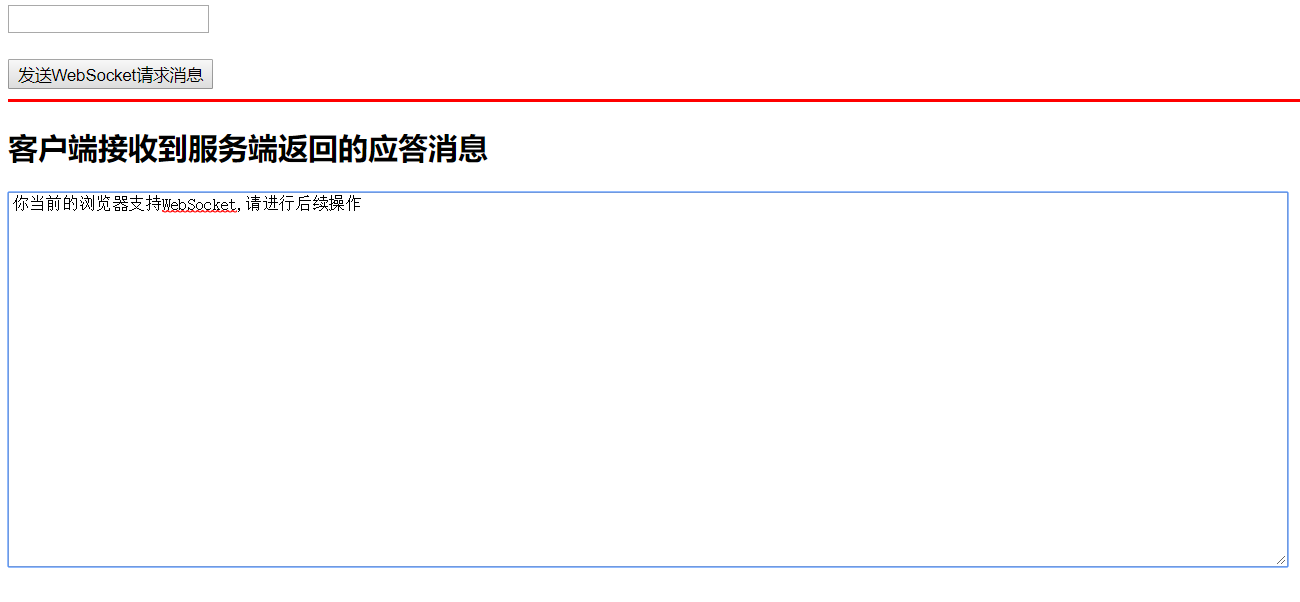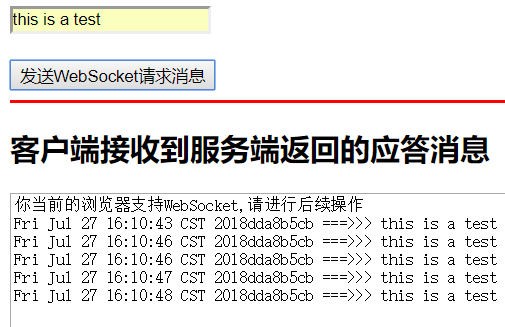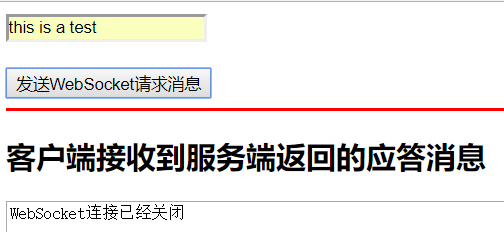【Netty】Netty入门之WebSocket小例子
服务端:
引入Netty依赖
<!-- netty -->
<dependency>
<groupId>io.netty</groupId>
<artifactId>netty-all</artifactId>
<version>4.1.27.Final</version>
</dependency>
WebSocket全局配置类的编写
/** * 存储整个工程的全局配置 */ public class NettyConfig { /** * 存储每一个客户端接入进来时的channel对象 */ public static ChannelGroup group = new DefaultChannelGroup(GlobalEventExecutor.INSTANCE); }
接收/处理/响应客户端websocket请求的核心业务处理类
package com.imooc.netty; import java.util.Date; import io.netty.buffer.ByteBuf; import io.netty.buffer.Unpooled; import io.netty.channel.ChannelFuture; import io.netty.channel.ChannelFutureListener; import io.netty.channel.ChannelHandlerContext; import io.netty.channel.SimpleChannelInboundHandler; import io.netty.handler.codec.http.DefaultFullHttpResponse; import io.netty.handler.codec.http.FullHttpRequest; import io.netty.handler.codec.http.HttpResponseStatus; import io.netty.handler.codec.http.HttpVersion; import io.netty.handler.codec.http.websocketx.CloseWebSocketFrame; import io.netty.handler.codec.http.websocketx.PingWebSocketFrame; import io.netty.handler.codec.http.websocketx.PongWebSocketFrame; import io.netty.handler.codec.http.websocketx.TextWebSocketFrame; import io.netty.handler.codec.http.websocketx.WebSocketFrame; import io.netty.handler.codec.http.websocketx.WebSocketServerHandshaker; import io.netty.handler.codec.http.websocketx.WebSocketServerHandshakerFactory; import io.netty.util.CharsetUtil; /** * 接收/处理/响应客户端websocket请求的核心业务处理类 */ public class MyWebSocketHandler extends SimpleChannelInboundHandler<Object> { private WebSocketServerHandshaker handshaker; private static final String WEB_SOCKET_URL = "ws://localhost:8888/websocket"; /** * 客户端与服务端创建连接的时候调用 */ @Override public void channelActive(ChannelHandlerContext ctx) throws Exception { NettyConfig.group.add(ctx.channel()); System.out.println("客户端与服务端连接开启..."); } /** * 客户端与服务端断开连接的时候调用 */ @Override public void channelInactive(ChannelHandlerContext ctx) throws Exception { NettyConfig.group.remove(ctx.channel()); System.out.println("客户端与服务端连接关闭..."); } /** * 服务端接收客户端发送过来的数据结束之后调用 */ @Override public void channelReadComplete(ChannelHandlerContext ctx) throws Exception { ctx.flush(); } /** * 工程出现异常的时候调用 */ @Override public void exceptionCaught(ChannelHandlerContext ctx, Throwable cause) throws Exception { cause.printStackTrace(); ctx.close(); } /** * 服务端处理客户端websocket请求的核心方法 */ protected void channelRead0(ChannelHandlerContext context, Object msg) throws Exception { if (msg instanceof FullHttpRequest) { // 处理客户端向服务端发起http握手请求的业务 this.handHttpRequest(context, (FullHttpRequest) msg); }else if (msg instanceof WebSocketFrame) { // 处理websocket连接业务 this.handWebsocketFrame(context, (WebSocketFrame) msg); } } /** * 处理客户端与服务端之前的websocket业务 */ private void handWebsocketFrame(ChannelHandlerContext ctx, WebSocketFrame frame){ // 判断是否是关闭websocket的指令 if (frame instanceof CloseWebSocketFrame) { handshaker.close(ctx.channel(), (CloseWebSocketFrame)frame.retain()); } // 判断是否是ping消息 if (frame instanceof PingWebSocketFrame) { ctx.channel().write(new PongWebSocketFrame(frame.content().retain())); return; } // 判断是否是二进制消息,如果是二进制消息,抛出异常 if (!(frame instanceof TextWebSocketFrame)){ System.out.println("目前我们不支持二进制消息"); throw new RuntimeException("【"+this.getClass().getName()+"】不支持消息"); } // 返回应答消息 // 获取客户端向服务端发送的消息 String request = ((TextWebSocketFrame) frame).text(); System.out.println("服务端收到客户端的消息====>>>" + request); TextWebSocketFrame tws = new TextWebSocketFrame(new Date().toString() + ctx.channel().id() + " ===>>> " + request); // 群发,服务端向每个连接上来的客户端群发消息 NettyConfig.group.writeAndFlush(tws); } /** * 处理客户端向服务端发起http握手请求的业务 */ private void handHttpRequest(ChannelHandlerContext ctx, FullHttpRequest req){ if (!req.decoderResult().isSuccess() || !("websocket".equals(req.headers().get("Upgrade")))) { this.sendHttpResponse(ctx, req, new DefaultFullHttpResponse(HttpVersion.HTTP_1_1, HttpResponseStatus.BAD_REQUEST)); return; } WebSocketServerHandshakerFactory wsFactory = new WebSocketServerHandshakerFactory(WEB_SOCKET_URL, null, false); handshaker = wsFactory.newHandshaker(req); if (handshaker == null) { WebSocketServerHandshakerFactory.sendUnsupportedVersionResponse(ctx.channel()); }else{ handshaker.handshake(ctx.channel(), req); } } /** * 服务端向客户端响应消息 */ private void sendHttpResponse(ChannelHandlerContext ctx, FullHttpRequest req, DefaultFullHttpResponse res){ if (res.status().code() != 200) { ByteBuf buf = Unpooled.copiedBuffer(res.status().toString(), CharsetUtil.UTF_8); res.content().writeBytes(buf); buf.release(); } // 服务端向客户端发送数据 ChannelFuture f = ctx.channel().writeAndFlush(res); if (res.status().code() != 200) { f.addListener(ChannelFutureListener.CLOSE); } } }
WebSocket初始化连接时各个组件的类实现
package com.imooc.netty; import io.netty.channel.ChannelInitializer; import io.netty.channel.socket.SocketChannel; import io.netty.handler.codec.http.HttpObjectAggregator; import io.netty.handler.codec.http.HttpServerCodec; import io.netty.handler.stream.ChunkedWriteHandler; /** * 初始化连接时候的各个组件 */ public class MyWebSocketChannelHandler extends ChannelInitializer<SocketChannel> { @Override protected void initChannel(SocketChannel e) throws Exception { e.pipeline().addLast("http-codec", new HttpServerCodec()); e.pipeline().addLast("aggregator", new HttpObjectAggregator(65536)); e.pipeline().addLast("http-chunked", new ChunkedWriteHandler()); e.pipeline().addLast("handler", new MyWebSocketHandler()); } }
WebSocket启动类的编写
package com.imooc.netty; import io.netty.bootstrap.ServerBootstrap; import io.netty.channel.Channel; import io.netty.channel.EventLoopGroup; import io.netty.channel.nio.NioEventLoopGroup; import io.netty.channel.socket.nio.NioServerSocketChannel; /** * 程序的入口,负责启动应用 */ public class Main { public static void main(String[] args) { EventLoopGroup bossGroup = new NioEventLoopGroup(); EventLoopGroup workGroup = new NioEventLoopGroup(); try { ServerBootstrap b = new ServerBootstrap(); b.group(bossGroup, workGroup); b.channel(NioServerSocketChannel.class); b.childHandler(new MyWebSocketChannelHandler()); System.out.println("服务端开启等待客户端连接...."); Channel ch = b.bind(8888).sync().channel(); ch.closeFuture().sync(); } catch (Exception e) { e.printStackTrace(); }finally{ // 退出程序 bossGroup.shutdownGracefully(); workGroup.shutdownGracefully(); } } }
客户端
编写客户端页面
<html>
<head>
<meta http-equiv="Content-Type" content="text/html; charset = utf-8"/>
<title>WebSocket客户端</title>
<script type="text/javascript">
var socket;
if(!window.WebSocket){
window.WebSocket = window.MozWebSocket;
}
if(window.WebSocket){
socket = new WebSocket("ws://localhost:8888/websocket");
socket.onmessage = function(event){
var ta = document.getElementById('responseContent');
ta.value += event.data + "\r\n";
};
socket.onopen = function(event){
var ta = document.getElementById('responseContent');
ta.value = "你当前的浏览器支持WebSocket,请进行后续操作\r\n";
};
socket.onclose = function(event){
var ta = document.getElementById('responseContent');
ta.value = "";
ta.value = "WebSocket连接已经关闭\r\n";
};
}else{
alert("您的浏览器不支持WebSocket");
}
function send(message){
if(!window.WebSocket){
return;
}
if(socket.readyState == WebSocket.OPEN){
socket.send(message);
}else{
alert("WebSocket连接没有建立成功!!");
}
}
</script>
</head>
<body>
<form onSubmit="return false;">
<input type = "text" name = "message" value = ""/>
<br/><br/>
<input type = "button" value = "发送WebSocket请求消息" onClick = "send(this.form.message.value)"/>
<hr color="red"/>
<h2>客户端接收到服务端返回的应答消息</h2>
<textarea id = "responseContent" style = "width:1024px; height:300px"></textarea>
</form>
</body>
</html>
测试
启动服务端,然后打开客户端页面

客户端向服务端发送WebSocket消息,观察结果

服务端控制台:

关闭服务端



